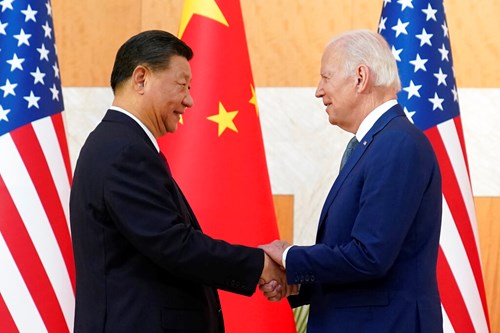Americans have more to worry about than TikTok if they hope to keep their private information away from the Chinese government.
At least eight U.S. telecom providers have been hacked by the Chinese, White House officials revealed last week.
Be informed, not misled.
CNN reported that ATT and Verizon, number 1 and 2 among telecom service providers in the U.S., are among the companies compromised by the Chinese.
The scheme has been in the making, possibly for as long as two years, and has affected dozens of countries, according to media reports.
U.S. officials believe no classified communications have been compromised, but the hacking continues.
And the Biden Administration has kept the American people in the dark, for the most part.
Some, not all, Chinese hackers have been rooted out, Anne Neuberger, President Joe Biden’s top cyber advisor, said in a conference call with reporters.
She said that companies that have worked closely with U.S. cyber experts are farther along than others.
Neuberger divulged the scope of the hack a day after the FBI, and the Cybersecurity and Infrastructure Security Agency issued guidance intended to help root out the hackers and prevent similar cyberespionage in the future. White House officials cautioned that the number of telecommunication firms and countries impacted could still grow.
In November, the Associated Press said, "A federal investigation into Chinese government efforts to hack into U.S. telecommunications networks has revealed a 'broad and significant' cyberespionage campaign aimed at stealing information from Americans who work in government and politics, the FBI said Wednesday."
Hackers affiliated with Beijing have compromised the networks of “multiple” telecommunications companies to obtain customer call records and gain access to the private communications of “a limited number of individuals,” according to a joint statement issued by the FBI and the federal Cybersecurity and Infrastructure Security Agency.
The FBI did not identify any of the individuals targeted by the hackers but said most of them “are primarily involved in government or political activity.”
The hackers also sought to copy “certain information that was subject to U.S. law enforcement requests pursuant to court orders,” the FBI said, suggesting the hackers may have been trying to compromise "programs like those subject to the Foreign Intelligence Surveillance Act, or FISA, which grants American spy agencies sweeping powers to surveil the communications of individuals suspected of being agents of a foreign power.”
Neuberger said that the U.S. believes that the hackers were able to access to communications of senior U.S. government officials and prominent political figures through the hack.
The very nature of the spy game is to keep your information private. Jake Denton, a research associate for The Heritage Foundation’s Tech Policy Center, believes Americans are being kept in the dark.
“The more I talk to folks about this, the little the public seems to know,” Denton said on American Family Radio yesterday.
As Biden heads out the door, this is one of the “more significant national security scandals of our lifetimes,” Denton said.
China 'toe-to-toe' with U.S.
“It seems like this could be our future for the immediate future, at least,” Denton said.
American Family News reported this:
It’s also far from the only China problem that Donald Trump will inherit on Jan. 20.
China’s military and economy make it a rival unlike any most in the U.S. have experienced, Sen. Josh Hawley (R-Missouri) said on Washington Watch Wednesday.
“You think about the Soviet Union, how powerful they were. They never had an economy ever to rival ours. I mean, sort of close in the 50s. After that, we blew them away economically. China is already with us toe-to-toe economically. Their military is larger than ours is,” Hawley told show host Tony Perkins.
Instead of rethinking the U.S.-China relationship after COVID-19, a pandemic that a U.S. House report last week concluded began with a virus produced in a Chinese lab in Wuhan, the Biden administration has gone in the other direction, Hawley said.
One of China’s greatest assets in its relationship with the U.S. is the Democrats’ Green New Deal.
“It’s just a code for massive giveaways to China,” Hawley said. “Solar panels, where are they made overwhelmingly? China. Wind turbines? China.”
To make matters worse, these items are made in China by slave labor, “the Uyghurs, who are an enslaved religious minority. We are literally financing that. It’s insane,” Hawley said.
“I think we ought to say to these foreign manufacturers that are based in other countries, whether it's China or anywhere else, if you want to have access to our market, you've got to make a certain percentage of your goods in the United States of America with American labor,” Hawley said.
But access to global markets leads to corporate riches. The dollar sign is often nearby when policy decisions are made.
“Just look at the NBA. You remember LeBron James just a few years ago advocating for what was happening in Hong Kong, dramatic crackdown on democracy in Hong Kong, and LeBron James is out there defending the Chinese government. Why? Well, it's all about the money. They need the access to the Chinese market,” Hawley said.
So, could there be a connection between a spy balloon that drifts across much of the Continental U.S. and the hacking of telecom companies that the U.S. seemingly cannot eradicate?
Living in a scary world.
How can we feel safe in a world that seems to be spiraling out of control? Where are we to turn for the safety and security we all long for? God has the answer. It's tucked away in a letter Paul wrote toward the end of the first century.
Candace Brown Doud has written a book titled "Seeking Safety In A Scary World," a study of the biblical book of Ephesians.
The teaching is particularly directed at those feeling scared about the world we live in.
Be Informed. Be Discerning. Be Vigilant. Be Engaged. Be Courageous. Be Prayerful.


